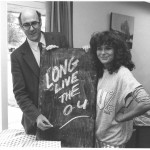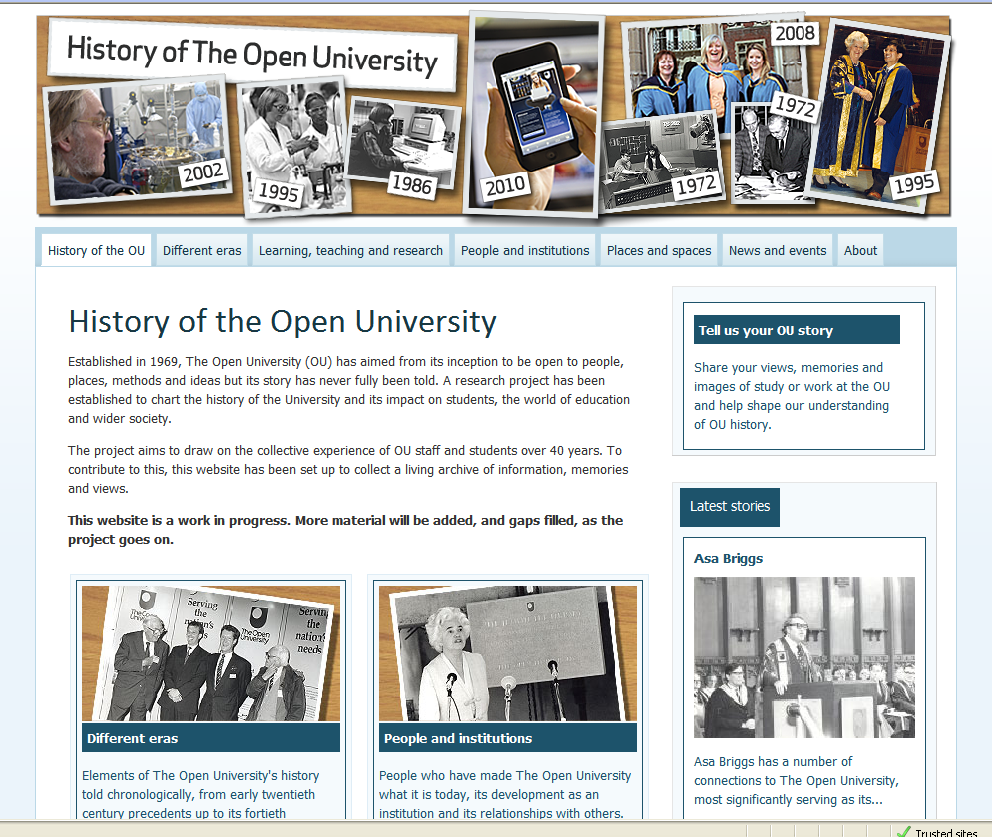Posted on June 14th, 2011 at 9:00 am by Daniel Weinbren
The history of the OU was an important element of a discussion on Monday, 13 June 2011 at the British Academy, London.
After a welcome from Robin Jackson, Chief Executive and Secretary of the British Academy there was an introduction from the chair of the panel, Sir Peter Scott, Professor of Higher Education Studies, Institute of Education University of London (Vice-Chancellor Kingston University till December 2010, earlier Editor Times Higher Education Supplement introduced. He spoke warmly of the innovative social democratic ethos of the OU and invited Professor Alan Tait, Pro-Vice-Chancellor Curriculum and Awards, Open University to address the question, ‘Flexible learning: the future higher education landscape?’ The PVC told his audience of approximately 70 people about the initial development of the OU in the face of criticism from civil servants, politicians of left and right and the BBC. He explained the ways in which it might be seen as flexible and some of its strategies for coping with the uncertainties which face the HE sector. Taking up the theme of the innovative nature of the OU a Fellow of the Society for Research into Higher Education, Lewis Elton asked how it was that OU had been pioneered in the often conservative UK and not adopted or adapted for use elsewhere. Alan Tait explained that there were many universities which had adapted the blend of teaching communication through broadcasting and correspondence with some contact with personal tutors.
The next speaker was Carl Lygo, pictured, Chief Executive Officer, BPP Holdings, and Principal BPP University College of Professional Studies. Read the rest of this entry »
Posted in Events, History of the OU, Politics | No Comments »
Posted on June 7th, 2011 at 8:11 pm by Daniel Weinbren
A new private university college is to be launched, specialising in the arts and humanities and charging tuition fees of £18,000 a year. The privately funded New College of the Humanities will be based in Bloomsbury, London and plans to admit its first undergraduates in October 2012, offering degrees validated by the University of London. The intention is that the staff will teach exactly the same syllabi as the University of London but the college will not be part of that University.
The University of London issued a clarification about the links with NCH.
“To avoid any confusion, it should be made clear that NCH is not, and will not be, a part of the University of London.”
There is no agreement for NCH students to have access to the University of London’s Senate House library – other than the same access available to other external students and Birkbeck, University of London, stated that ‘Birkbeck has no links with New College and no agreement to provide New College with access to any of its facilities’. Although exactly who owns teaching materials is not entirely clear the development has caused some concern among staff at the University of London about this use of materials developed within the state system.
Read the rest of this entry »
Posted in Ideas, People, Politics | No Comments »
Posted on June 3rd, 2011 at 5:50 pm by Rachel Garnham
 An e-newsletter to students and alumni featuring a link to the article about the history of the OU on Platform has generated a rush of submissions to the recently launched history of the OU website, ranging from tales of summer schools and degree ceremonies to the way OU study has changed the lives of three generations in one family.
An e-newsletter to students and alumni featuring a link to the article about the history of the OU on Platform has generated a rush of submissions to the recently launched history of the OU website, ranging from tales of summer schools and degree ceremonies to the way OU study has changed the lives of three generations in one family.
The stories can be read in the section of the website about students.
Posted in Website | No Comments »
Posted on May 26th, 2011 at 3:49 pm by Rachel Garnham
The current story line in BBC popular drama Waterloo Road, in which the school caretaker’s OU studies are an excuse for a blossoming romance with the head teacher, is just the latest example of how the OU has become a handy plot device for television fiction.
line in BBC popular drama Waterloo Road, in which the school caretaker’s OU studies are an excuse for a blossoming romance with the head teacher, is just the latest example of how the OU has become a handy plot device for television fiction.
The OU page on Wikipedia reports that other television series in which characters have studied with the OU courses have included Ever Decreasing Circles and Goodnight Sweetheart; in Brookside, Sheila Grant was accused of having an affair with her tutor; and there are many other references. Read the rest of this entry »
Posted in History of the OU | No Comments »
Posted on May 24th, 2011 at 9:57 pm by Daniel Weinbren

According to Cherwell, 177 dons have no confidence in the Universities Minister, David Willets, Jonathan Black, the director of a careers service and Fellow of New College, Oxford sees this as a wider lack of confidence in the government. Elsewhere there is a lack of confidence in changes which are being made to universities. Although she is against charging higher tuition fees Valérie Pécresse, the minister for higher education and research of France has still succeeded in provoking professors and students to take to the streets (in both 2007 and 2009) and demand her resignation. She has argued for 15 big universities across the country. This has echoes of an idea associated with former Open University VC John Daniel, who coined the word mega-university (see Daniel, John S (1996) Mega-universities and Knowledge Media: Technology Strategies for Higher Education, Kogan Page, London). He, however, looked to the past, noting that Walter Perry ‘did more than anyone to build the foundations for today’s mega-universities. It is largely because of him that we can use the word ‘mega’ about these institutions’. Perhaps if Ministers better understood the evolution of the OU then academics would have more faith in their pronouncements about the best way forwards.
Posted in People, Politics | No Comments »
Posted on May 17th, 2011 at 11:17 am by Rachel Garnham
 So far publicity for our new website has focussed on asking students, staff and alumni to share their OU experiences – such as on Platform, the University’s online community website. Whilst we hope that more people will share their stories, the website also provides an opportunity for those with particular knowledge or access to sources the project may not be aware of, to add links or material about aspects of the University’s history.
So far publicity for our new website has focussed on asking students, staff and alumni to share their OU experiences – such as on Platform, the University’s online community website. Whilst we hope that more people will share their stories, the website also provides an opportunity for those with particular knowledge or access to sources the project may not be aware of, to add links or material about aspects of the University’s history.
For example, Read the rest of this entry »
Posted in History of the OU, Website | No Comments »
Posted on May 10th, 2011 at 2:43 pm by Daniel Weinbren
London Metropolitan University is to cut its course offering by 70 per cent, including closing courses in history.
The University of Wales Institute, Cardiff is reported to be planning to axe its history and politics department.
There are plans afoot for Glasgow University to cut and merge courses in history, archaeology and classics.
Strathclyde University has emailed students about a “phased withdrawal from the following areas” – music, sociology, geography and community education.
However, there is still an interest in the of history at the OU both in Milton Keynes and London where, on 5th May a large number of academics attended a seminar at the Institute of Historical Studies in which the history of the OU was assessed by Dan Weinbren. If you want to see the powerpoint slides, contact us.
Posted in Higher education | No Comments »
Posted on May 4th, 2011 at 3:00 pm by Rachel Garnham
 With holidays over and word slowly spreading about the new History of the OU website, it is pleasing to see the first user-submitted stories appearing. Read the rest of this entry »
With holidays over and word slowly spreading about the new History of the OU website, it is pleasing to see the first user-submitted stories appearing. Read the rest of this entry »
Posted in History of the OU, Website | No Comments »
Posted on April 19th, 2011 at 10:00 am by Rachel Garnham

The history of the OU project has launched a new website designed to showcase elements of the University’s history and to gather views and perspectives from others outside the project.
More material will be added as the project progresses. In the meantime, please browse the site. Any feedback would be very welcome.
Posted in History of the OU, Website | No Comments »
Posted on April 19th, 2011 at 9:48 am by Rachel Garnham

A big thank you to this weekend’s OUSA conference for including a presentation about the History of the OU project in their agenda. It was a great opportunity to meet students, many of whom have been studying with the OU for many years, and hear about their experiences. I hope that some of these will be written up and added to the new website as they would certainly add to our understanding of OU history.
As requested, the slides from the presentation given at the conference are available here: OUSA 2011.
Posted in Events | No Comments »






